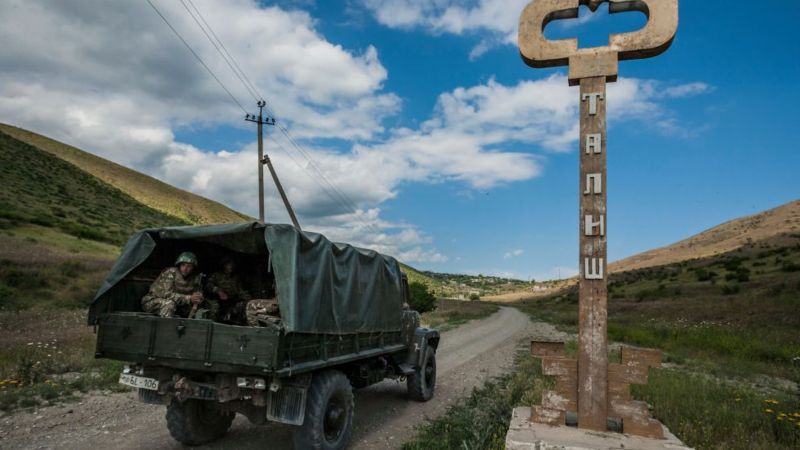Clashes have begun between Armenian and Azerbaijani forces over the disputed Nagorno-Karabakh region, with at least one Azerbaijani helicopter shot down.
Armenia said Azerbaijan had launched an air and artillery attack. It later declared martial law and total military mobilisation.
Azerbaijan said it was responding to shelling along the whole front. Both sides have reported civilian deaths.
The long-running conflict has flared up again in recent months.
Russia's Foreign Ministry called for an immediate ceasefire and talks to stabilise the situation.
Both Armenia and Azerbaijan were part of the Soviet Union before its collapse in 1991.
For four decades they have been stuck in an unresolved conflict over Nagorno-Karabakh, internationally recognised as part of Azerbaijan but controlled by ethnic Armenians.
Border fighting in July killed at least 16 people, prompting the largest popular demonstration for years in the Azerbaijani capital Baku calling for full mobilisation and the recapture of the region.
What are the two sides saying?
The Armenian Defence Ministry said an attack on civilian settlements, including the regional capital Stepanakert, began at 08:10 local time (04:10 GMT).
It said it had shot down two helicopters and three drones, and destroyed three tanks.
"Our response will be proportionate, and the military-political leadership of Azerbaijan bears full responsibility for the situation," it said in a statement.
Officials said a woman and child had been killed, and further reports of casualties were being verified.
Armenia's government declared martial law and total military mobilisation, shortly after a similar announcement by the authorities in the separatist region.
"Get ready to defend our sacred homeland," Prime Minister Nikol Pashinyan said in a statement. He earlier accused Azerbaijan of "pre-planned aggression".
Meanwhile Azerbaijan blamed Armenia for starting the fighting.
Intensive shelling of several villages had led to civilians being killed or wounded, and severe damage to infrastructure, its defence ministry said.
The country announced a "counter-offensive operation of our troops along the entire front to suppress the combat activity of the armed forces of Armenia and ensure the safety of the civilian population".
It added that one helicopter had been lost but the crew had survived, and 12 Armenian air defence systems had been destroyed. It denied other losses reported by Armenia.
Later on Sunday, a defence ministry spokesperson said several villages "which were under enemy occupation for many years, have been liberated".
Nagorno-Karabakh - key facts
A mountainous region of about 4,400 sq km (1,700 sq miles)
Traditionally inhabited by Christian Armenians and Muslim Turks
In Soviet times, it became an autonomous region within the republic of Azerbaijan
Internationally recognised as part of Azerbaijan, but majority of population is ethnic Armenian
An estimated one million people displaced by 1990s war, and about 30,000 killed
Separatist forces captured some extra territory around the enclave in Azerbaijan in the 1990s war
Stalemate has largely prevailed since a 1994 ceasefire
Russia has traditionally supported the Armenians, while Turkey is an ally of Azerbaijan
2px presentational grey line
In a TV address, Azerbaijani President Ilham Aliyev said Armenia's policy was "a new war for new territories".
"Armenia has been consciously provoking Azerbaijan, and they will see the bitter results of this," he said.
"Armenia is an occupying country, and an end must be put to this occupation and an end will be put to it."
Tensions last flared into open conflict in 2016, when both sides clashed over the disputed territory for four days.
The Organisation for Security and Co-operation in Europe (OSCE) has long been trying to mediate a settlement of the conflict, with diplomats from France, Russia and the US - making up the OSCE Minsk Group - trying to build on a ceasefire accord signed in 1994.
Source: BBC





